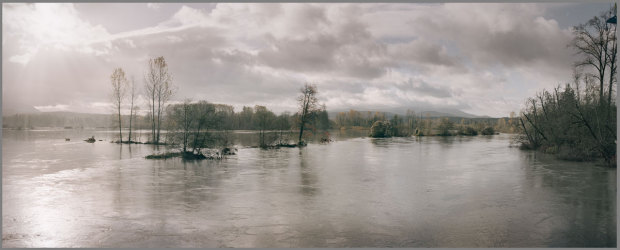Two Photographic Panoramas
 Sunday, May 6, 2007 at 09:45AM
Sunday, May 6, 2007 at 09:45AM Today I'm sharing two panoramas from recent work in progress. First a panorama taken from at the height of the record breaking flood we had on the Snoqualmie river. This was taken from the deck of Tolt bridge, which was closed to auto traffic ( I crossed the 'danger' striped yellow tape to get the shot)
This second one has a working title of Clear Cut Panorama, not the most original title I'm afraid. I'll have to think about changing that.
This image seems to play two chords at once. On one level the view plucks a note of regret for the destruction of a natural habitat. But simultaneously we recognize a beautiful moment in the day cycle of nature––warm tones and the bright wash of fresh growth. The clear light of morning and the abundant grasslands of summer thriving in the tombstone stumps of the harvested trees create an atmosphere of ambivalence. Is this image beautiful or ugly or both? This tension interests me as an artist. It would be even more interesting to have a juxtaposition between this image and another made the day after the loggers blasted through. Perhaps even a third image taken in twenty years. Even the trees still standing in the background of this image are probably only forty to fifty years old, a far cry from the giant spruces and furs that once covered this land. As a modern human I accept that we have to harvest some timber from the earth, But I do hope that we can let great tracts of our forests return to the magnificent state of old growth forest.
I took this image last summer while driving down the pacific coast from Seattle to San Francisco. I found this landscape where highway 101 takes a jog inland and goes through the coastal range that sits between Oregon's Willamette valley and the rugged sea shore. I apparently made the trip at the height of the camping season, for every campground I came across displayed the dreaded 'Campground Full' sign. I was driving the new family minivan and had all the seats out so I could sleep in the back and was determined to sleep for free out in the fresh air rather than pay for a stuffy motel rooms. It was dark when I drove up an old logging road and took the least maintained fork in the road several times until I found a flat stretch of isolated dirt track where I could park the van on level ground off to the side. I slept well to the sound of crickets and crisp coastal mountain air. The next morning I awoke to birdsong before sunrise and headed back to the main road. On the way back to the main highway, the vague shadows I had seen off to the side of the road the night before were transformed to a real forest. I came across a side road that headed out into a fairly recent clear cut .I decided to follow the road, hoping that I would find a nice spot for a landscape composition. My road ended on a little bluff where I took this image just as the sun was rising.
Tech talk: This composition is compiled from 4 2.25 color negatives shot with the Hasselblad, probably on the 80mm lens, a really good focal length for stitching panoramas. I chose color neg because I knew the dynamic range would be brutal. There's got to be at least 12 stops between the detail on the carbonized tree stumps and the brightest highlights on the clouds getting the first sun of the day. Color Reversal film would have forced me to choose one of these two place to have detail, not both. As it was, I struggled to get an image that did justice to both of these zones. I think modern Color neg can resolve a ratio of 9 to 1 gray tone to gray tone. So if I expose the blackened stumps to be just at the darkest gray, almost black, that also gets me just a light-light gray just a bit below white detail on the clouds. This is on the negative of course, the contact sheet I get back with the processed film will not resolve this much information. I need to get the information off the negative in the scan. Once I've resolved the tonalities to my satisfaction, I then embark upon a complicated process of color correcting, including some tricks I've developed in Photoshop for removing the annoying cast of color-neg film. I hope to post a page in the future showing that process as well.
 Panorama
Panorama 


Reader Comments